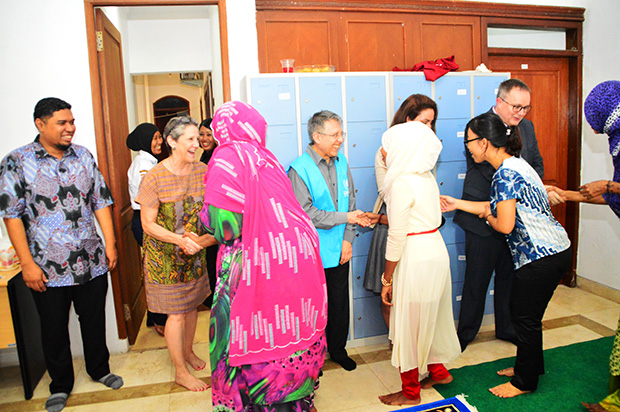
Leslie Wilson (in orange dress) is among the CWS and UNHCR staff greeting refugee girls and women in Jakarta. Courtesy photo.
Recently, I spent a few energizing hours with two dozen teenage girls who, after an astoundingly circuitous journey from East Africa to Indonesia, have found themselves in the care and protection of Church World Service. The girls each left home on their own in search of safety and asylum, and none of them has relatives or adult guardians with them in Indonesia. They became known to CWS because of our long-standing partnership with the United Nations High Commission for Refugees, which is often asylum-seekers’ first point of contact when they come to Jakarta.
Arriving from countries as far flung and diverse as Somalia, Ethiopia, Iran, Afghanistan and Myanmar (Burma), thousands of refugees and asylum seekers find their way to Indonesia each year; and how they do so is a wonder to be me – even though, factually, I do know the means (people smuggling) and routes (air, land and ocean) by which they travel.
The occasion for meeting the Somali and Ethiopian girls was the official opening of a CWS-managed shelter, or group home, for them. In addition to the 20-plus teenagers there are some single women in their twenties and thirties who have also found themselves alone and at risk of harm without the protection of a family. Before the girls were able to come together to live in community, they lived in foster care or were in Indonesian government care, which is essentially legal detention – with all the bleakness such a situation brings to mind.
CWS has been partnering with the UNHCR in Jakarta for years to manage group living and basic protection for 80 unaccompanied boys, mostly from Afghanistan’s Hazara community and from Somalia. Last year, with additional funds and encouragement from the United States Bureau of Population, Refugees and Migration we opened two additional homes for boys. Then with funds from the Australian Department of Immigration and Border Patrol we were able to open a shelter for girls and young women who are ‘persons of concern’ to the UNHCR.
As I was caught up in the festive atmosphere the girls decided to create to celebrate their new home (for now), I found myself marveling at their positive energy and what seemed, in the brief hours of the event, an amazing joie de vivre given the hard realities of their lives.
In thinking more about the afternoon’s festivities, and the chats I had with a few girls who spoke some English, I thought back to the time about 25 years ago when I started on my own journey to Southeast Asia. In 1990, I left the U.S. for Thailand from a position of privilege and optimism and with a strong safety net, compliments of the Peace Corps. By contrast, I knew that the girls and women I had just met left their homes out of fear and desperation. Perhaps some had feelings of optimism and hope, which helped them summon the courage to leave; but, even in the care and protection of our wonderful CWS team, I am sure their feelings will not always be positive and joyful.
Ages ago, I left my home country believing what the anthropologist Margaret Mead inspired many of us to believe, “… that a few caring people [can] change the world. For indeed that’s all who ever have.” Now, sensing the hope, yet knowing the uncertainty these girls face, I find myself reflecting on Mead’s words about trying to help effect positive change.
Since my early adventure as a Peace Corps community development Volunteer, I have been privileged and amazed by countless times of joining families, communities, students, mothers and teachers in a rich and interesting variety of activities that are loosely defined by those of us ‘in the business’ as development and humanitarian assistance. Much of the world understands such work to be ‘charity’ which, as characterizations go, is not at all bad.
But, of course, the work I am privileged to do is much more complex than charity and, in truth, it feels more like ennobling and enabling people to keep trying to have better lives: parents for their children, teachers for their students, community leaders for their neighbors, government workers for their fellow citizens, etc.
In being witness to so many people’s searching and working for a better life, my view has evolved over the years with some certainty that is it all by accident of birth that any of us has enough or faces want. To me ‘categories’ of enough include the basics – food, water, clothes and shelter – then supportive families and friends, schooling with helpful teachers, and of course good health. Beyond these, I see privilege and options – which so few people, relatively speaking, actually have.
And, even though I am very, very far from the often mentioned American ‘one percent’, I do understand my privilege and the abundant grace in my life. And so, with the refugee girls’ sense of hope in mind – and in my heart – I thank Hillary Clinton for reminding me of the Rev. John Wesley’s call to “Do all the good you can. By all the means you can. In all the ways you can. In all the places you can. At all the times you can. To all the people you can. As long as ever you can.”
Leslie Wilson is the CWS Regional Coordinator for Asia.
